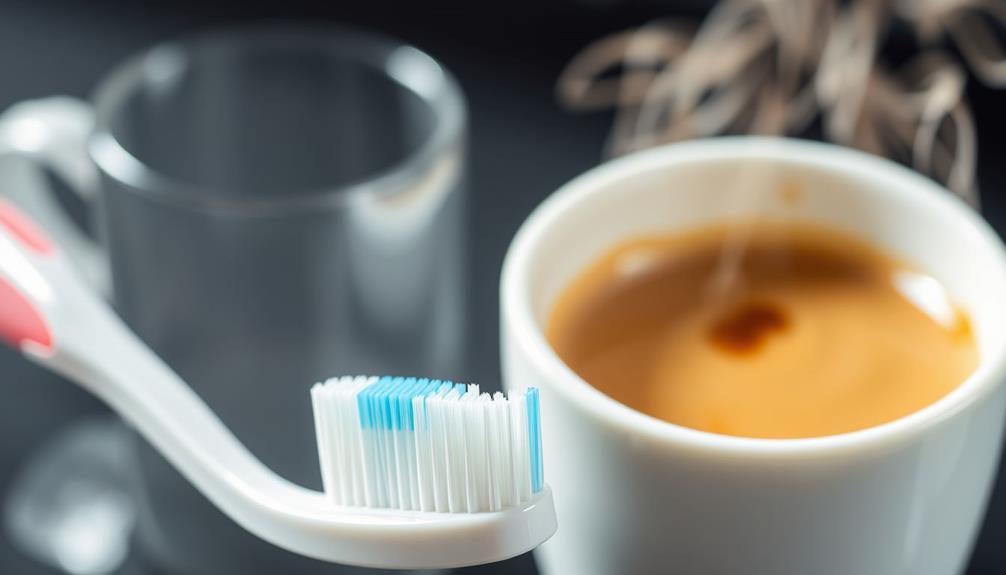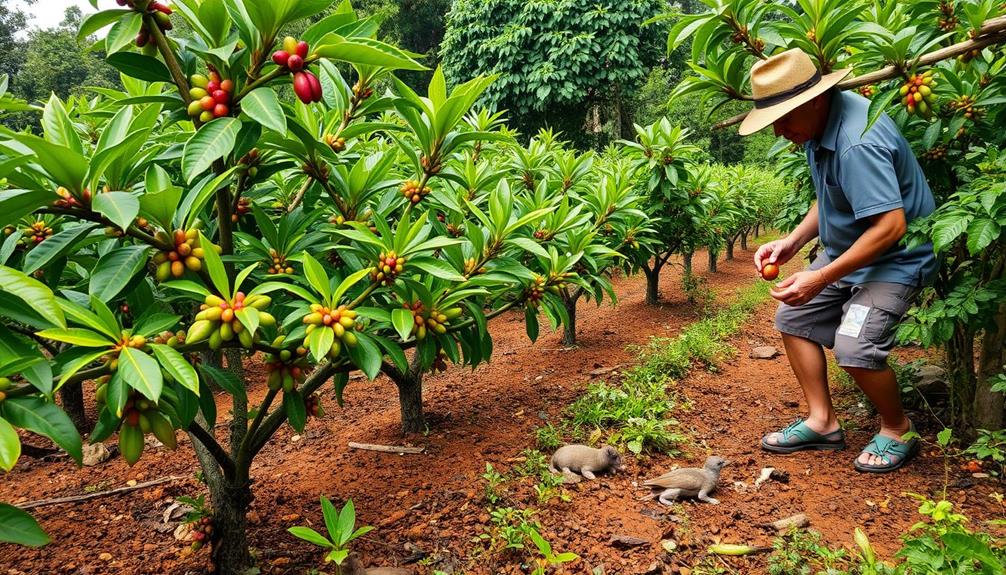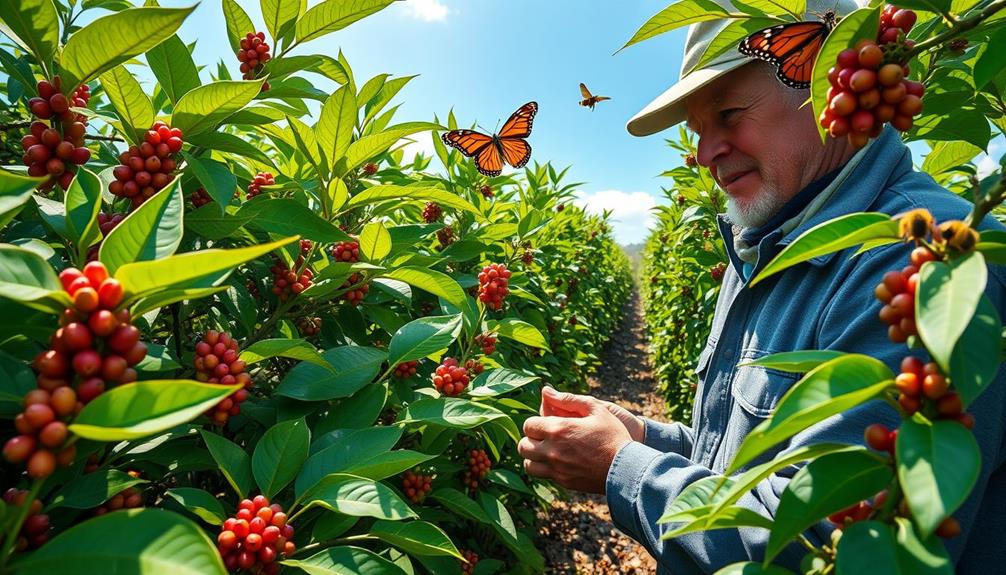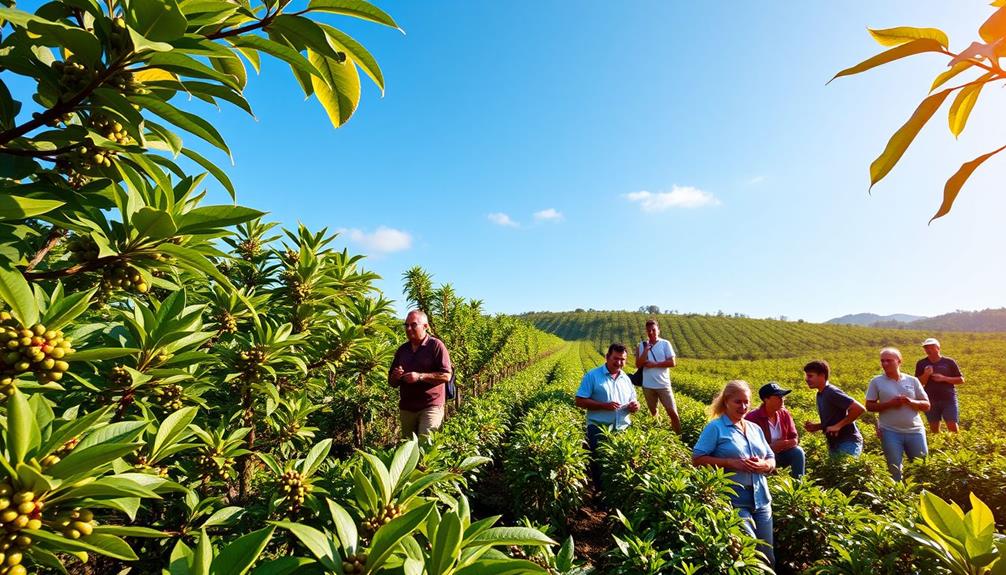Coffee Basics
How Do You Make a Coffee

Welcome to our guide on making the perfect cup of coffee! We’re here to share our expertise and passion for serving you the best brew possible.
Get ready to embark on a coffee-making journey where we’ll take you through every step, from choosing the finest beans to adding those final touches.
With our detailed instructions and insider tips, you’ll soon be brewing coffee like a pro.
So grab your favorite mug, and let’s get started!

Key Takeaways
- Choosing the right coffee beans involves considering the flavor profile, roast level, and origin.
- Proper storage in airtight containers away from light, heat, and moisture preserves the freshness and flavor of coffee beans.
- The grind size of coffee beans determines the flavor and strength of the brew.
- Different brewing methods require specific equipment and coffee-to-water ratios.
Choosing the Right Coffee Beans
When choosing the right coffee beans, we consider factors such as flavor profile, roast level, and origin.
Roasting techniques play a crucial role in enhancing the unique flavors and aromas of the beans. Different roasts, such as light, medium, and dark, produce varying taste profiles, allowing us to cater to different preferences. Light roasts retain the bean’s original flavors, while dark roasts develop bold and smoky notes.
Additionally, the origin of the beans contributes to their flavor characteristics. Coffee beans grown in different regions possess distinctive flavors influenced by the local climate and soil.
To ensure optimum freshness and flavor, proper coffee bean storage is essential. Storing beans in airtight containers away from light, heat, and moisture helps preserve their quality, resulting in a more satisfying cup of coffee.

Grinding the Coffee Beans
To achieve the perfect cup of coffee, we focus on the crucial step of grinding the coffee beans. The grind size plays a vital role in determining the flavor and strength of the brew.
A coffee grinder is an essential tool in this process, allowing us to achieve the desired consistency. There are two main types of coffee grinders: manual and electric.
Manual grinders require physical effort to grind the beans, but they offer more control over the grind size. On the other hand, electric grinders are more convenient and efficient, allowing for a quick and consistent grind.
Whichever type you choose, it’s important to select a grinder with adjustable settings, allowing you to customize the grind size to suit your brewing method.

Brewing Methods and Equipment
We use various brewing methods and equipment to make our coffee. Coffee brewing techniques vary depending on personal preference and desired flavor profiles.
Some popular methods include pour-over, French press, espresso, and drip brewing. Each method has its own unique characteristics and requires specific equipment.
For pour-over brewing, a kettle with a gooseneck spout and a pour-over dripper are essential. French press brewing requires a French press plunger and a coarse grind. Espresso brewing demands a high-pressure espresso machine and a finely ground coffee. Drip brewing relies on a drip coffee maker with a filter basket.
It’s important to choose the right brewing method and equipment to achieve the desired taste and aroma in our coffee.

Now that we’ve discussed brewing methods and equipment, let’s move on to the next step of perfecting the coffee-water ratio.
Perfecting the Coffee-Water Ratio
To achieve the perfect coffee-water ratio, our most crucial consideration is the amount of coffee grounds in relation to the volume of water. Measuring techniques play a vital role in ensuring consistency and quality in every cup.
Here are three key points to keep in mind when perfecting the coffee-water ratio:
- Use a scale: Eyeballing the amount of coffee grounds can lead to inconsistency. Invest in a digital scale to accurately measure the desired amount. A general rule of thumb is to use 1 to 2 tablespoons of coffee for every 6 ounces of water.
- Experiment with ratios: Coffee preferences vary, so don’t be afraid to adjust the coffee-water ratio to suit your taste. Start with a 1:15 ratio (1 part coffee to 15 parts water) and gradually tweak it until you find your perfect balance.
- Consider the brew method: Different brewing methods may require different ratios to achieve the desired flavor. For example, a French press may require a coarser grind and a higher coffee-to-water ratio than a pour-over method.
Adding the Finishing Touches
After perfecting the coffee-water ratio, the next step is to add the finishing touches to our delicious cup of coffee. This is where we can truly get creative and make each cup a work of art. One way to do this is by mastering the foam art technique. With a steady hand and a bit of practice, you can create intricate designs on the surface of your coffee, adding an extra touch of elegance and sophistication. Another way to enhance the flavor of your coffee is by experimenting with alternative sweeteners. Whether it’s a drizzle of honey, a sprinkle of cinnamon, or a dash of vanilla extract, these little additions can take your coffee to new heights of deliciousness. So go ahead, have fun, and let your imagination soar as you put the finishing touches on your perfect cup of coffee.

| Foam Art Technique | Alternative Sweeteners |
|---|---|
| Create intricate designs on the surface of your coffee | Experiment with honey, cinnamon, or vanilla extract |
| Adds elegance and sophistication | Enhances the flavor of your coffee |
| Requires practice and a steady hand | Allows you to personalize your cup of coffee |
Frequently Asked Questions
How Long Does It Take to Brew a Cup of Coffee Using Different Brewing Methods?
Brewing time varies depending on the coffee brewing techniques used. Different methods, such as espresso or pour-over, have their own unique timeframes. It’s important to find the method that suits your taste and brewing time preferences.
What Are Some Common Mistakes to Avoid When Grinding Coffee Beans?
When it comes to making a great cup of coffee, it’s important to avoid common mistakes with coffee grinder maintenance and coffee bean storage. Proper care and storage ensure the freshest and most flavorful brew.
Are There Any Health Benefits Associated With Drinking Coffee?
There are numerous health benefits associated with drinking coffee. It can help lower the risk of certain diseases, improve cognitive function, and boost metabolism. However, it’s important to be mindful of potential health risks and individual caffeine tolerance.
Can You Reuse Coffee Grounds to Make a Second Batch of Coffee?
Yes, you can reuse coffee grounds to make a second batch of coffee. Simply add fresh water and brew for a shorter time to avoid over-extraction. This reduces waste and allows for a delicious, sustainable cup of joe.

How Can I Make My Coffee Taste Less Bitter?
To balance acidity in coffee and enhance its flavor, we can try various techniques. Adding a pinch of salt, using filtered water, and experimenting with different brewing methods can all contribute to a less bitter and more enjoyable cup of coffee.
Conclusion
Making a cup of coffee is an art that requires careful attention to detail. From choosing the right beans to grinding them just right, every step plays a vital role in creating the perfect brew.
By experimenting with different brewing methods and equipment, you can find the one that suits your taste preferences.
Don’t forget to perfect the coffee-water ratio and add the finishing touches to elevate your coffee experience.

So go ahead, indulge in the passion of making a delicious cup of coffee that will awaken your senses.
Justin is a seasoned author, coffee and tea enthusiast, and an essential member of the Cappuccino Oracle team. With a keen appreciation for the complexities of coffee, coffee alternatives, and tea, Justin has dedicated his professional career to exploring these realms and sharing his insights with readers worldwide.
Justin’s immersion in the world of coffee, coffee alternatives, and tea began at a young age, kindling a passion that extended beyond mere consumption. This love for these beverages led him to combine his talent for writing with his devotion to coffee and tea, bringing him to Cappuccino Oracle as a dedicated author.
Coffee Basics
Coffee and Oral Health: Staining, Cavity Prevention, and More
A deep dive into how coffee affects your smile reveals surprising insights and tips that could transform your dental health—discover what you can do!

Coffee can affect your oral health greatly. Its tannin content often leads to staining, with 60% of coffee drinkers noticing discoloration. The acidity in coffee can weaken enamel, increasing cavity risk, especially if you add sugar. To minimize these effects, try drinking your coffee in one sitting, rinse your mouth afterward, or use a straw for iced coffee. Additionally, maintaining good dental hygiene and regular check-ups can help manage these issues. If you're curious about healthier alternatives and more tips for protecting your smile, you'll find plenty of helpful information ahead.
Key Takeaways
- Coffee's tannin content and dark pigments can lead to significant staining of teeth over time.
- Its acidic nature can weaken enamel, increasing the risk of cavities if consumed frequently.
- Rinsing with water after drinking coffee can help neutralize acidity and reduce enamel erosion.
- Using a straw for iced coffee minimizes direct contact with teeth, lessening stain potential.
- Alternatives like green tea or herbal teas can promote oral health without the staining risks associated with coffee.
Impact of Coffee on Staining

Coffee can markedly impact the appearance of your teeth due to its tannin content, which contributes to staining. When you're drinking coffee regularly, even just one cup a day can lead to noticeable discoloration.
The dark pigments in coffee cling to your enamel, which can undergo erosion because of coffee's acidic nature. This erosion makes your teeth more susceptible to stains, compromising your overall oral health. Additionally, it's vital to be aware of potential side effects of various beverages on dental health, as cold medications can also have implications for your teeth.
Studies reveal that around 60% of coffee drinkers report some level of staining on their teeth. To combat coffee stains, it's important to adopt effective habits. Rinsing your mouth with water after consuming coffee can help wash away some of the pigments and acids, reducing the risk of staining.
Additionally, limiting your coffee consumption can greatly minimize discoloration and protect your enamel from further erosion. Regular dental care is also fundamental in managing the effects of coffee on your teeth.
Routine cleanings and check-ups can help keep staining at bay and maintain your smile's brightness. By being mindful of your coffee habits and prioritizing your oral health, you can enjoy your favorite brew without sacrificing your teeth's appearance.
Cavity Risk and Coffee Consumption

When you indulge in your favorite cup of coffee, it's important to evaluate its potential impact on your dental health. Regular coffee consumption can weaken your tooth enamel due to its acidic nature, increasing your risk of cavities and decay.
If you sweeten your coffee, be cautious—sugar notably contributes to cavity formation, as bacteria in your mouth feast on it and produce harmful acids that attack your enamel.
Curiously, you can enhance your brewing experience by understanding the mechanics of various brewing methods that minimize acidity. Drinking black coffee may help protect against decay-causing bacteria, potentially slowing plaque and biofilm growth.
To further safeguard your oral health, consider drinking water after enjoying your coffee. This practice helps to neutralize acidity and reduce the risk of enamel erosion and cavities.
Also, be mindful of your brushing routine. It's advisable to wait at least an hour after brushing your teeth before consuming coffee. This precaution prevents damaging softened enamel that can occur right after brushing.
Tips for Minimizing Stains

Enjoying coffee doesn't have to mean sacrificing the brightness of your smile. To minimize stains, try drinking your coffee in one sitting instead of prolonged sipping. This reduces bacteria buildup and helps protect your enamel.
If you love iced coffee, consider using a straw to limit direct contact between the coffee and your teeth, which can greatly cut down on stains. Additionally, be aware that certain foods and beverages, like ice cream, can also affect your oral health; moderation is key when indulging in sweet treats ice cream and health considerations.
After you consume coffee, rinse your mouth with water immediately. This simple step helps wash away acids and tannins that contribute to staining.
Additionally, be mindful of the sugars in your coffee; these can promote plaque buildup and worsen oral health. Opt for lighter coffee options or those made from Arabica beans, as they tend to stain less than darker roasts.
Regular dental cleanings and professional polishing can also help combat coffee stains and maintain tooth whiteness. By following these tips, you can enjoy your favorite beverage while keeping your smile bright and healthy.
Coffee Alternatives for Oral Health

For those looking to maintain oral health without sacrificing flavor, exploring coffee alternatives can be a game-changer. You'll find that these options not only taste great but also offer benefits for your teeth and gums.
Additionally, some options like celery juice are known for their anti-inflammatory properties, which can contribute to overall oral health.
- Green tea: Packed with polyphenols, it can help inhibit the growth of cavity-causing bacteria.
- Herbal teas: Caffeine-free options like chamomile or peppermint don't stain teeth and can soothe your mouth.
- White tea: With lower tannin content than coffee, it reduces staining while providing antioxidant properties.
- Infused water: Hydrate with fruits or herbs for a revitalizing drink that promotes better oral health without acidity or sugars.
Additionally, non-dairy milk alternatives, such as almond or oat milk, can add a creamy texture to your beverages without the staining effects of coffee.
Importance of Dental Hygiene

Maintaining good dental hygiene is essential for everyone who wants a healthy smile. Consistent brushing with fluoride toothpaste twice daily is key for effective plaque removal and helps prevent cavities, which affect over 90% of adults at least once in their lifetime.
Additionally, being aware of potential oral health issues is important, as studies show that early detection can lead to better treatment outcomes, similar to the importance of early breast cancer screenings in women's health mammography aims to detect.
Don't forget to floss daily; it's critical for getting rid of food particles and plaque that toothbrushes can't reach, reducing your risk of cavities and gum disease.
Regular dental check-ups allow for early detection of potential issues, safeguarding your overall oral health. With about 50% of adults experiencing gum disease, these visits are essential for identifying problems before they escalate.
By implementing a proper oral hygiene routine, you can greatly lower the likelihood of developing stains, cavities, and other dental issues.
Educational initiatives play a critical role in raising awareness about effective dental health practices. When you understand the importance of oral hygiene, you're empowered to make better decisions for your smile.
Prioritizing these habits not only enhances your dental health but also contributes to your confidence and overall well-being. So, take charge of your oral hygiene; your future self will thank you!
Frequently Asked Questions
How Do You Prevent Teeth From Staining After Drinking Coffee?
To prevent teeth from staining after drinking coffee, rinse your mouth with water, use a straw, eat crunchy fruits or veggies, and schedule regular dental cleanings. Consider lighter coffee options for less stain potential, too.
Can Coffee Aid in the Prevention of Dental Cavities?
You know what they say, "An ounce of prevention is worth a pound of cure." Coffee can potentially reduce cavity risk by inhibiting harmful bacteria and slowing plaque growth, especially when consumed without sugar or milk.
Do Coffee Stains Cause Cavities?
Coffee stains don't directly cause cavities. However, if you consume sugary coffee and neglect oral hygiene, you increase your risk. Regular brushing and rinsing can help protect your teeth from decay and staining.
Can You Reverse Coffee Stains on Teeth?
You might think coffee stains are permanent, but you can reverse them! Regular dental cleanings, professional whitening treatments, and consistent use of over-the-counter products can greatly diminish those pesky stains on your teeth.
Conclusion
To sum up, while coffee can stain your teeth and may pose a cavity risk, you don't have to give it up entirely. By practicing good dental hygiene and following a few simple tips, you can enjoy your favorite brew without worrying too much about your smile. Remember, it's all about balance—savor your coffee but keep your oral health in check. With a little effort, you can have your cup and drink it too!
In the vast and diverse world of coffee, coffee alternatives, and tea, Olivia has found her calling. As an author and a dedicated coffee and tea aficionado, her work for Cappuccino Oracle reflects her profound love and understanding of the intricate complexities found within these beverages. Olivia’s passion for the subject serves as both a catalyst for her creativity and a connection point with her audience.
Olivia’s appreciation for coffee, coffee alternatives, and tea blossomed at an early age. She discovered that these beverages invigorated her senses and stimulated her creative spirit. From the nuanced flavors of single-origin roasts to the captivating narratives intertwined with coffee, coffee alternatives, and tea trade and culture, Olivia found an unlimited source of inspiration in her daily cup.
Her love for these beverages and her talent for storytelling eventually converged at Cappuccino Oracle. As an author, Olivia’s mission is to illuminate the intricate tapestry that makes up the world of coffee, coffee alternatives, and tea. Her articles span a diverse range of topics, encompassing everything from the unique flavors of different brews to the sociocultural history intertwined with their cultivation and consumption.
Coffee Basics
The Psychology of Coffee Rituals: How Your Daily Cup Affects Mental Well-being
In exploring the psychology of coffee rituals, discover how your daily cup can profoundly impact mental well-being and what that means for you.

Your daily coffee ritual is more than just a habit; it greatly influences your mental well-being. Enjoying a cup can boost your mood and alertness, serving as a moment of self-care. This routine fosters mindfulness, reduces stress, and strengthens social bonds with friends. However, moderation is key; while 2-3 cups may lower anxiety and depression risk, excessive caffeine can lead to sleep disruptions and increased anxiety. Understanding these dynamics helps maintain balance in your routine, ensuring you reap the benefits without drawbacks. There's much more to uncover about your relationship with that daily cup of coffee.
Key Takeaways
- Daily coffee rituals enhance mood, alertness, and mental well-being through routine and self-care practices.
- Moderate caffeine consumption (2-3 cups daily) is linked to lower risks of depression and anxiety.
- Coffee rituals foster social connections, which are crucial for emotional health and community support.
- Caffeine can serve as a coping mechanism, but excessive intake may lead to anxiety and sleep disturbances.
- Recognizing psychological dependence on caffeine helps maintain balance and promotes healthier coping strategies.
Benefits of Coffee Rituals

Many people find that incorporating coffee rituals into their daily routines can greatly enhance their well-being. Engaging in these rituals not only boosts your mood and alertness but also serves as a crucial form of self-care. By enjoying coffee, especially with friends, you strengthen social connections, which is essential for mental well-being.
Exploring various brewing methods can add a delightful variety to your coffee experience, further enriching these rituals.
Research shows that moderate consumption of coffee is linked to a lower risk of depression and anxiety. The familiar routine of brewing and savoring a cup can reduce stress and create a comforting structure in your day. As you focus on the preparation, you practice mindfulness, allowing yourself a moment of peace amid life's chaos.
Moreover, thinking about coffee, including its aromas and rituals, can increase your arousal and enhance cognitive performance. This mental boost helps you tackle tasks more effectively and think more concretely.
Negative Impacts of Caffeine

While coffee rituals can enhance well-being, it's important to recognize that caffeine can also have adverse effects. Consuming too much caffeine can remarkably reduce your sleep quantity by about 10% and your sleep quality by nearly 40%. This lack of restorative sleep can lead to long-term sleep disturbances, ultimately impacting your mental well-being.
Additionally, the importance of selecting the right cold medication can't be overlooked, as certain medications can also contribute to sleep issues.
You might also notice increased anxiety levels while drinking coffee, with notable rises in psychological distress observed during consumption. This can hinder your ability to focus and relax.
Moreover, if you try to cut back on caffeine, you could experience withdrawal symptoms like headaches and irritability, which can interfere with your daily activities and overall mental functioning.
Chronic overconsumption can create a dependency, where you need larger amounts of caffeine to feel the same effects. Unfortunately, the negative impacts on sleep quality can linger for up to three days after your last caffeine intake, further affecting your cognitive performance.
Social Aspects of Coffee Consumption

Coffee consumption isn't just about the beverage itself; it's often a social experience that enhances enjoyment and fosters deeper connections with friends and family. Sharing a cup can create a sense of community, essential for emotional support and social interaction. Engaging in regular coffee rituals strengthens interpersonal relationships, reinforcing social bonds that contribute positively to your mental well-being.
| Social Benefits of Coffee Consumption | Impact on Mental Well-being |
|---|---|
| Enhances enjoyment | Promotes relaxation |
| Fosters connections | Lowers depression risk |
| Creates a sense of community | Increases feelings of happiness |
| Serves as stress relief | Reduces anxiety |
| Strengthens social bonds | Encourages positive mood states |
Participating in coffee-related gatherings can greatly boost your mood and create a shared experience that alleviates stress. Studies show that moderate coffee consumption in social settings is linked to lower risks of depression and anxiety. So, the next time you sip your favorite brew with friends, remember that it's not just coffee; it's a ritual that enhances your overall mental health and wellbeing.
Psychological Dependence on Caffeine

You might find that your daily coffee ritual has become a cornerstone of your routine, helping you tackle stress and fatigue.
However, relying on caffeine as a coping mechanism can lead to withdrawal symptoms that cloud your mental clarity when you try to cut back.
Additionally, just as with juice diets that may lead to nutrient deficiencies if not balanced, understanding this dependence is vital for maintaining your mental well-being.
juice diets can provide insights into the importance of balance in your daily consumption habits.
Daily Rituals and Routine
Mornings often begin with the familiar aroma of freshly brewed coffee, a ritual that many people embrace as fundamental to their daily routine. This daily coffee consumption can lead to a psychological dependence, as you might find yourself relying on caffeine to kick-start your day.
The comforting ritual of brewing and savoring your coffee not only signals the start of your morning but also becomes intertwined with your sense of mental well-being. There are numerous coffee varieties available, each offering unique flavor profiles that enhance the experience of this daily ritual, encouraging enthusiasts to explore their favorites and enjoy the benefits of quality coffee numerous varieties available.
As you sip your coffee, you may notice that withdrawal symptoms like headaches or irritability can occur if you skip your usual cup. This signals a deeper reliance on caffeine, reinforcing its role in your daily routine.
Social interactions often revolve around coffee, enhancing feelings of connection while further entrenching habitual consumption. Over time, you might develop a tolerance, requiring more caffeine to achieve that same boost of alertness, which only deepens your dependence.
While coffee can certainly elevate your mood and productivity, it's important to be aware of how this ritual shapes your daily life. Balancing your coffee habits can help guarantee that your relationship with caffeine remains a positive aspect of your mental well-being.
Caffeine as Coping Mechanism
While many enjoy the energizing effects of caffeine, it's crucial to recognize how it can become a coping mechanism during stressful times. Regular caffeine consumption often leads to psychological dependence, where you rely on that daily cup to function and feel motivated. When stress hits, reaching for coffee can feel like a quick fix, enhancing your mood and cognitive performance.
However, this reliance can backfire. If you try to cut back, you might experience withdrawal symptoms such as headaches, fatigue, and irritability—commonly referred to as "mental fog." Social rituals around coffee drinking further entrench this dependence, as these moments become linked with relaxation and bonding.
Here's a table that highlights the effects of caffeine as a coping mechanism:
| Benefit | Drawback | Impact on Mental Well-being |
|---|---|---|
| Enhances mood | Psychological dependence | Temporary relief |
| Boosts energy | Withdrawal symptoms | Long-term reliance |
| Social bonding | Increased stress levels | Mixed effects |
Recognizing these dynamics can help you understand your relationship with caffeine and its impact on your mental well-being.
Withdrawal and Mental Clarity
Caffeine withdrawal can feel like a heavy weight on your mind, clouding your thoughts and making it hard to focus. When you rely on coffee for daily motivation, that psychological dependence can lead to a cascade of withdrawal symptoms, including headaches, fatigue, and irritability.
These symptoms can severely undermine your mental clarity, making it difficult to perform everyday tasks. Understanding your financial health is essential, as stress from financial issues can compound the effects of caffeine withdrawal on your cognitive function.
As your tolerance builds, you might find yourself needing more coffee consumption to achieve the same energy-boosting effects. This cycle reinforces your reliance on caffeine, highlighting its addictive potential.
When you skip your usual cup or two, the cognitive fog sets in, and your productivity takes a hit. The social rituals around coffee can further entrench this dependence, often encouraging you to use caffeine as a crutch for stress and fatigue.
Understanding how withdrawal affects your mental clarity can empower you to reassess your relationship with caffeine. By acknowledging this dependence, you can explore healthier coping strategies that won't leave you feeling mentally drained when you miss your daily fix.
Caffeine and Mental Health

Caffeine can boost your mood and sharpen your focus, making those morning cups of coffee feel like a necessity.
However, while moderate consumption might help reduce feelings of anxiety, overdoing it can lead to increased stress and sleepless nights.
It's important to find the right balance to enjoy coffee's benefits without compromising your mental health.
Caffeine's Mood Enhancements
Many coffee lovers appreciate their daily brew not just for its rich flavor but also for its mood-boosting benefits. Research shows that moderate caffeine consumption, like enjoying 2-3 cups of coffee daily, can lower the risk of depression and anxiety.
Notably, as the demand for jobs in various sectors, including AI Ethicist Jobs, grows, people may also seek comfort in their coffee rituals to enhance focus and creativity. You'll likely find that caffeine enhances your mood and increases alertness, making you feel more energized throughout the day.
Here are some key benefits of caffeine for your mood:
- Increased alertness: Caffeine can help you stay awake and focused.
- Enhanced mood: Drinking coffee is linked to improved overall mood.
- Cognitive performance: It sharpens your attention and reaction times.
- Reduced fatigue: Caffeinated coffee can alleviate feelings of tiredness.
- Lower depression risk: Regular consumption may decrease your chances of experiencing depression.
While these benefits are appealing, moderation is essential. Excessive coffee consumption can lead to anxiety and sleep disturbances, counteracting the positive effects.
Anxiety and Caffeine Consumption
For those who enjoy their daily coffee ritual, it's important to contemplate how caffeine affects anxiety levels.
Moderate coffee consumption—about 2-3 cups daily—can actually lower your risk of depression and anxiety, as highlighted by recent studies. Notably, individuals with emotional dysregulation, like those with Borderline Personality Disorder (BPD), may experience heightened sensitivity to caffeine's effects.
However, it's vital to be aware that high caffeine intake might ramp up anxiety levels, with three out of four anxiety measures showing significant increases during coffee consumption.
While enjoying your morning brew, consider the potential downsides. Chronic coffee consumption can lead to long-term sleep disturbances, which may worsen anxiety symptoms and overall mental health.
It's also worth noting that if you add artificial sweeteners to your coffee, you could face a higher risk of depression. In contrast, drinking coffee without sweeteners appears to lower that risk compared to those who don't drink coffee at all.
Sleep Disruption Risks
While you might savor that afternoon coffee break, it's vital to recognize how it can disrupt your sleep patterns. Caffeine, a stimulant, can greatly impact your sleep quality and overall mental well-being.
Research shows that coffee consumption can reduce sleep quantity by 10% and sleep quality by nearly 40%. This can lead to sleep disruption that lingers for days. Incorporating practices like gentle stretching before bedtime can help mitigate some of the negative effects of caffeine on sleep.
To help you understand the risks, consider these key points:
- Increased caffeine intake heightens anxiety levels, with three out of four measures showing notable rises.
- The negative effects on sleep quality may persist for up to three days after caffeine intake.
- Chronic coffee consumption can lead to long-term sleep disturbances, negatively affecting mood.
- It's advisable to avoid coffee after 2 PM to improve sleep quality.
- Sleep disruption can ultimately impact cognitive function and daily performance.
Being mindful of your coffee habits is vital. If you want to maintain good sleep quality and mental well-being, think twice about that late afternoon cup.
Prioritizing restful sleep can greatly enhance your overall health and mood.
Strategies for Healthy Consumption

Finding balance is vital when it comes to coffee consumption, especially if you want to harness its mental health benefits. Aim for moderation; studies suggest that enjoying 2-3 cups daily can lower your risks of depression and anxiety.
Additionally, incorporating essential oils for relaxation can enhance the calming effects of your coffee ritual. However, be mindful of when you drink coffee. It's wise to avoid caffeine after 2 PM to prevent sleep disturbances that can negatively impact your mental well-being.
Incorporating coffee into social rituals can further enhance your enjoyment and connection with others. Sharing a cup with friends not only boosts your mood but fosters a sense of community.
Just remember, while coffee can be beneficial, it's important to recognize its addictive potential. Sudden cessation or overconsumption may lead to withdrawal symptoms like headaches and irritability, disrupting your daily routine.
To guarantee healthy consumption, listen to your body and adjust your intake as needed. By finding the right balance, you can enjoy your coffee while reaping its mental health benefits without the drawbacks.
Prioritize moderation and mindfulness to maintain a positive relationship with your daily cup.
Frequently Asked Questions
How Does Coffee Affect Your Mental Health?
Coffee can boost your mood and alertness, but moderation's key. Enjoying a daily cup may reduce anxiety and foster social connections, while overindulgence could lead to increased stress and sleep issues. Balance is essential.
What Happens to Your Brain if You Drink Coffee Everyday?
Drinking coffee daily can boost your cognitive performance by 10-15%. It sharpens your focus, enhances reaction time, and can even reduce your risk of depression, but watch out for potential dependency and withdrawal symptoms.
What Is the Psychology Behind Coffee?
The psychology behind coffee lies in its ability to enhance focus and stimulate creativity. Just thinking about coffee can boost your attention, making you more productive and helping you tackle tasks with greater clarity and urgency.
What Is the Psychology of a Cup of Tea?
You might think tea's just another drink, but it's more than that. When you sip tea, you engage in a mindful ritual that calms your mind, connects you socially, and boosts your overall mood considerably.
Conclusion
Incorporating coffee rituals into your daily routine can uplift your mood and foster connection, yet it's essential to balance that joy with mindfulness. While a warm cup can spark creativity, too much caffeine might leave you jittery and anxious. Enjoy the rich social interactions coffee brings, but be aware of the potential for dependence. By savoring your daily brew with intention, you can cultivate both mental clarity and well-being, turning a simple ritual into a source of joy.
In the vast and diverse world of coffee, coffee alternatives, and tea, Olivia has found her calling. As an author and a dedicated coffee and tea aficionado, her work for Cappuccino Oracle reflects her profound love and understanding of the intricate complexities found within these beverages. Olivia’s passion for the subject serves as both a catalyst for her creativity and a connection point with her audience.
Olivia’s appreciation for coffee, coffee alternatives, and tea blossomed at an early age. She discovered that these beverages invigorated her senses and stimulated her creative spirit. From the nuanced flavors of single-origin roasts to the captivating narratives intertwined with coffee, coffee alternatives, and tea trade and culture, Olivia found an unlimited source of inspiration in her daily cup.
Her love for these beverages and her talent for storytelling eventually converged at Cappuccino Oracle. As an author, Olivia’s mission is to illuminate the intricate tapestry that makes up the world of coffee, coffee alternatives, and tea. Her articles span a diverse range of topics, encompassing everything from the unique flavors of different brews to the sociocultural history intertwined with their cultivation and consumption.
Coffee Basics
Sustainable Coffee Farming: Health Benefits for Consumers and the Planet
Brew a cup of sustainable coffee and explore how your choice benefits your health and the environment—discover the surprising impacts on our planet.

Sustainable coffee farming offers you numerous health benefits while nurturing the planet. By choosing organic coffee, you enjoy a cleaner beverage with higher antioxidant levels and less risk of harmful chemical exposure. This eco-friendly approach not only promotes better digestive health but also supports local ecosystems by enhancing biodiversity and reducing pollution. Moreover, the commitment to fair trade practices guarantees farmers receive equitable compensation, boosting local economies. So, as you sip your delicious cup of coffee, you're contributing to a healthier planet and community. Curious about the broader impact of your coffee choice? You'll discover more fascinating insights soon.
Key Takeaways
- Organic coffee reduces harmful chemical exposure, promoting healthier consumption for individuals concerned about their health and the environment.
- Higher antioxidant levels in organic coffee, such as chlorogenic acid, contribute to improved overall health benefits for consumers.
- Sustainable farming practices enhance soil health, which in turn supports a healthier ecosystem and environment for future generations.
- Supporting local organic coffee farmers strengthens local economies, allowing for better community health and educational resources.
- Choosing organic coffee fosters transparency and trust between consumers and producers, encouraging ethical consumption and environmental stewardship.
Definition of Organic Coffee

When you choose organic coffee, you opt for a product that's grown without synthetic fertilizers or pesticides, ensuring a chemical-free cultivation process. This approach not only protects your health but also contributes to sustainable farming practices, which can lead to a richer coffee flavor profile different brewing methods that enhances your drinking experience.
Organic coffee is cultivated under strict organic certification standards, which prioritize environmental stewardship and the integrity of natural systems. By avoiding synthetic pesticides and fertilizers, organic coffee farming enhances soil health and promotes biodiversity.
Healthier soil leads to better water retention and less runoff, creating cleaner waterways and nurturing diverse habitats for wildlife. These practices also benefit you as a consumer, as the natural processing methods often result in a purer, more flavorful cup of coffee.
Moreover, when you choose organic coffee, you're supporting ethical consumerism. Many organic coffee producers engage in fair trade practices, ensuring that farmers receive equitable pay and work in safe conditions.
This commitment to ethical sourcing means your coffee choice makes a positive impact on communities. To summarize, organic coffee isn't just a beverage; it embodies a commitment to health, sustainability, and social responsibility, making it a wise choice for both you and the planet.
Environmental Impact

When you choose organic coffee, you're supporting biodiversity preservation strategies that protect local ecosystems.
These practices enhance soil health and reduce pollution, ensuring a cleaner environment for future generations.
Additionally, opting for sustainably sourced coffee can have positive implications for local communities and economies, highlighting the importance of financial considerations for elderly care.
Biodiversity Preservation Strategies
Biodiversity preservation in coffee farming relies on sustainable practices that not only protect the environment but also enhance agricultural productivity. By adopting organic farming techniques, you can create habitats for diverse wildlife, which supports bird populations and maintains ecological balance in coffee-growing regions.
Utilizing polyculture systems fosters varied plant life, encouraging beneficial insects that aid in natural pest control. Additionally, implementing natural remedies alongside conventional practices can further enrich the farming ecosystem.
Organic certification mandates that you implement measures to preserve native species and combat deforestation. This guarantees coffee farming doesn't encroach on vital wildlife habitats. By maintaining vegetative buffers around your coffee fields, you help protect local waterways, essential for sustaining biodiversity and aquatic ecosystems.
Moreover, reducing synthetic chemical use in organic coffee farming minimizes pollution and chemical runoff. This not only protects surrounding ecosystems but also fosters a healthier environment for both wildlife and local communities.
Through these practices, you contribute to a thriving ecosystem, where native species flourish, and the balance of nature is maintained. Ultimately, your commitment to biodiversity preservation in coffee farming plays a significant role in promoting a sustainable future for both the planet and its inhabitants.
Soil Health Enhancement
Healthy soil is essential for sustainable coffee farming, as it directly impacts plant growth and productivity. In organic coffee farming, practices like using natural compost and green manure enhance soil health by improving soil structure and nutrient content. These methods support beneficial microbial life, which is vital for maintaining soil fertility.
Additionally, incorporating sustainable gardening techniques, such as using unique and wicked planters, can help optimize space and resources for coffee cultivation, ultimately benefiting both the plants and the environment.
To further enhance soil health, you can adopt the following techniques:
- Implement crop rotation to prevent soil erosion.
- Use cover cropping to maintain moisture and improve soil structure.
- Avoid synthetic fertilizers and pesticides to reduce soil pollution.
- Foster nutrient cycling to enhance biodiversity within the ecosystem.
- Focus on water retention strategies to support sustainable agricultural practices.
Pollution Reduction Techniques
Pollution poses a significant threat to ecosystems, but sustainable coffee farming offers effective techniques to mitigate its impact. One major benefit of organic coffee farming is its elimination of synthetic pesticides and fertilizers, which drastically reduces chemical runoff into waterways. This not only protects aquatic ecosystems but also guarantees cleaner water resources for local communities.
By incorporating practices such as mastering the art of bug out bags, farmers can prepare for emergencies and maintain resilience against environmental challenges.
By employing sustainable farming practices, such as crop rotation and natural pest control, you can help maintain soil health and minimize soil erosion. This prevents sedimentation and pollution of nearby streams and rivers, fostering a healthier environment.
Additionally, shade-grown coffee techniques enhance biodiversity and sequester carbon, addressing greenhouse gas emissions often associated with traditional coffee farming methods.
Promoting organic farming methods also supports the conservation of native species and habitats, decreasing the need for land conversion that typically leads to habitat destruction and further pollution.
Health Benefits

When you choose organic coffee, you're not just indulging in a flavorful beverage; you're also prioritizing your health. Organic coffee offers numerous health advantages that make it a smart choice for you and the planet. The absence of synthetic pesticides and fertilizers means you're reducing your risk of harmful chemical exposure, leading to a cleaner beverage choice.
Additionally, organic coffee can contribute to improved hydration, similar to other antioxidant-rich beverages like cranberry juice consumption, which may impact overall health positively.
Moreover, organic coffee often contains higher levels of antioxidants, such as chlorogenic acid, which may help reduce inflammation and combat free radicals in your body. Regularly sipping on organic coffee can also support better digestive health due to the natural processing methods that preserve beneficial compounds.
By opting for organic coffee, you're aligning with a healthier lifestyle, reflecting your commitment to safer products for both individual health and the environment.
Here are some health benefits of choosing organic coffee:
- Lower risk of chemical exposure
- Higher antioxidant content
- Improved digestive health
- Cleaner beverage choice
- Support for sustainable farming practices
Make the switch today and enjoy not only the rich flavors but also the health benefits that come with organic coffee!
Sustainable Farming Practices

Sustainable Farming Practices
Choosing organic coffee not only benefits your health but also supports sustainable farming practices that protect the environment. By opting for organic coffee farming, you help promote methods that enhance soil fertility through crop rotation and cover cropping. These techniques reduce erosion, leading to healthier ecosystems.
Additionally, sustainable coffee farms often utilize essential oils for pest management, which can minimize the need for synthetic chemicals and promote biodiversity.
Sustainable practices encourage biodiversity on coffee farms, allowing various plant and animal species to thrive, which supports ecological balance. Without synthetic fertilizers and pesticides, organic coffee farming greatly reduces chemical pollution, fostering healthier soil and promoting natural pest control through beneficial organisms.
Shade-grown coffee is another crucial technique that emulates natural forest ecosystems. It provides habitats for wildlife, contributing to the overall quality and flavor profile of the coffee beans you enjoy.
By implementing practices like composting and natural pest management, coffee farms can increase their long-term resilience against climate change and market fluctuations.
When you choose organic coffee, you're not just selecting a beverage; you're actively participating in a movement that values sustainable farming practices, leading to a cleaner environment and a more sustainable future.
Economic and Social Implications

The economic and social implications of sustainable coffee farming extend far beyond environmental benefits. Embracing organic coffee cultivation fosters self-sustaining economic cycles in local communities.
As fair trade practices elevate farmers' incomes, they can invest in essential areas like education and health services. Increased consumer demand for organic coffee not only stabilizes farmer income but also leads to consistent yields, enhancing both quality and quantity.
Additionally, sustainable practices can help farmers manage their finances better, similar to how a budget aids individuals in tracking their income and expenses.
Here are some key points to reflect on:
- Organic coffee often commands higher prices, boosting local economic growth.
- Investing in education and health reduces long-term health-related expenses in communities.
- Access to international markets opens up new trading opportunities for farmers.
- Local communities benefit from retaining more financial resources, enhancing overall welfare.
- Sustainable practices contribute to reduced chemical exposure, promoting healthier living.
Consumer Trends

You might've noticed that more coffee drinkers are choosing organic options lately, driven by a desire for healthier and more sustainable choices.
This trend aligns well with the growing awareness of best ways to make money online among consumers who prioritize ethical and eco-friendly products.
Many consumers are willing to pay a premium for organic coffee, which supports ethical farming practices and benefits the environment.
As you explore your coffee options, consider how your purchasing decisions can impact both farmers and the planet.
Growing Organic Demand
Rising interest in organic coffee reflects a broader shift toward eco-conscious consumption, as more consumers seek products that align with their values. This growing consumer demand isn't just a trend; it's a commitment to ethical sourcing and environmental stewardship.
Over the last decade, sales of organic coffee have surged, with many of you willing to pay a premium for products that resonate with your beliefs. Additionally, just as healthy dog snacks contribute to pet wellness, organic coffee can enhance your overall health and well-being.
Here's what you should know about this movement:
- Fair Trade Practices: Organic coffee often involves fair trade initiatives, ensuring farmers receive fair compensation.
- Health Benefits: Many believe organic coffee offers better health benefits due to its lack of synthetic pesticides.
- Sustainable Choices: Choosing organic supports sustainable coffee farming practices that protect ecosystems.
- Consumer Trust: Transparency in sourcing fosters trust and loyalty among consumers like you.
- Engagement Opportunities: Membership clubs and educational initiatives help you make informed decisions about your coffee purchases.
Ethical Purchasing Choices
As consumers become more aware of the impact of their purchases, ethical buying choices are gaining traction, especially in the coffee market. You might notice a growing preference for organic coffee, which often comes with a higher price tag but guarantees better income for farmers. This choice promotes ethical engagement within the coffee supply chain, fostering a sense of responsibility among buyers.
The surge in global demand for organic coffee reflects a strong eco-consciousness, as you prioritize sustainability and environmental stewardship. Fair trade initiatives play an essential role here, securing minimum prices for farmers and protecting their labor rights against exploitation. This commitment to fairness not only helps farmers but also enhances the health benefits associated with your coffee consumption.
Transparency in supply chains boosts your trust as a consumer, allowing you to verify the ethical and sustainable practices behind your purchases. Additionally, membership clubs and educational programs dedicated to organic coffee encourage informed consumer choices, aligning your habits with a culture of sustainable consumption.
Taste and Quality

Many coffee lovers have discovered that organic coffee often delivers a taste experience that stands out from conventionally grown varieties. The unique farming practices used in organic coffee cultivation contribute notably to its quality and flavor.
By utilizing shade-grown techniques, the beans mature more slowly, resulting in a richer taste profile. Without synthetic fertilizers and pesticides, the beans maintain their natural characteristics, leading to a smoother and more complex flavor.
Additionally, studies show that organic coffee typically contains higher levels of antioxidants. This not only enhances taste but also offers potential health benefits, making your coffee experience even more rewarding.
As consumers increasingly favor the taste and quality of organic coffee, the demand for these products encourages sustainable farming practices that support ecological balance.
- Enjoy a smoother cup with fewer bitter notes.
- Experience a broader range of flavors in your brew.
- Benefit from higher antioxidant levels.
- Support sustainable farming methods.
- Savor the rich, complex profiles unique to organic beans.
Choosing organic coffee means indulging in a beverage that's not only about taste but also about supporting better farming practices.
Commitment to Sustainability

Firehouse Coffee Roasters stands at the forefront of sustainable coffee practices by exclusively sourcing 100% organic coffees. This commitment to sustainability not only meets USDA organic standards but also supports local farmers and promotes environmental health. By choosing organic coffee, you're contributing to a healthier planet and community.
Here's a quick look at how these practices benefit you and the environment:
| Aspect | Benefits for Consumers | Benefits for the Environment |
|---|---|---|
| Health | Reduces exposure to chemicals | Promotes biodiversity |
| Ethical Sourcing | Supports fair trade practices | Minimizes soil degradation |
| Local Farmers | Strengthens local economies | Enhances habitat conservation |
| Consumer Demand | Fulfills demand for healthier options | Encourages sustainable farming |
Decaffeination Processes

Decaffeination processes play an essential role in providing consumers with flavorful coffee options that fit their lifestyle choices. Among these methods, the Swiss Water Process stands out as the primary chemical-free option for decaffeinating organic coffee. This technique uses only water and osmosis to extract caffeine while preserving the rich flavor profile of the beans.
Choosing organic decaffeinated coffee means you're opting for a product free from harmful synthetic chemicals, unlike conventional methods that often use ethyl acetate or methylene chloride. This natural approach not only guarantees a safer beverage for you but also enhances the health benefits associated with coffee consumption.
As consumers increasingly seek healthier beverage options, the demand for organic decaffeinated coffee continues to rise. Here are some key points to take into account:
- The Swiss Water Process is chemical-free.
- It retains the coffee's rich flavor profile.
- Organic coffee appeals to health-conscious consumers.
- It provides a safer product without synthetic chemicals.
- Enjoy the same coffee experience without caffeine.
Frequently Asked Questions
What Certifications Should I Look for in Sustainable Coffee?
When you're searching for sustainable coffee, look for certifications like Fair Trade, Rainforest Alliance, and Organic. These labels guarantee ethical practices, environmental protection, and high-quality beans, making your coffee choice both responsible and delicious.
How Does Sustainable Coffee Farming Affect Local Communities?
Imagine sipping coffee that empowers communities. Sustainable coffee farming boosts local economies, creates fair jobs, and preserves cultural heritage. You're not just enjoying a beverage; you're supporting farmers and fostering a thriving community.
Can I Grow Coffee Sustainably in My Backyard?
Yes, you can grow coffee sustainably in your backyard! Start by choosing the right coffee variety for your climate, using organic practices, and conserving water. Your efforts will benefit both your garden and the environment.
What Are the Best Brewing Methods for Organic Coffee?
Brewing organic coffee is like composing a symphony; each method brings its own melody. Try pour-over for clarity, French press for richness, or cold brew for smoothness. Experiment and find the harmony that delights your palate!
How Can I Support Sustainable Coffee Farmers Directly?
You can support sustainable coffee farmers directly by purchasing directly from them, seeking out fair trade brands, and participating in community-supported agriculture. Connecting with local roasters can also help guarantee your coffee choices benefit those farmers.
Conclusion
In choosing sustainable coffee, you're not just savoring rich flavors; you're planting seeds of change for the planet and your health. Each sip symbolizes a commitment to nurturing both nature and community, transforming your morning ritual into a powerful act of stewardship. As you indulge in that aromatic cup, remember it's more than coffee—it's a movement toward a greener future, where every bean tells a story of resilience and responsibility. Embrace this journey, and let it inspire others.
In the vast and diverse world of coffee, coffee alternatives, and tea, Olivia has found her calling. As an author and a dedicated coffee and tea aficionado, her work for Cappuccino Oracle reflects her profound love and understanding of the intricate complexities found within these beverages. Olivia’s passion for the subject serves as both a catalyst for her creativity and a connection point with her audience.
Olivia’s appreciation for coffee, coffee alternatives, and tea blossomed at an early age. She discovered that these beverages invigorated her senses and stimulated her creative spirit. From the nuanced flavors of single-origin roasts to the captivating narratives intertwined with coffee, coffee alternatives, and tea trade and culture, Olivia found an unlimited source of inspiration in her daily cup.
Her love for these beverages and her talent for storytelling eventually converged at Cappuccino Oracle. As an author, Olivia’s mission is to illuminate the intricate tapestry that makes up the world of coffee, coffee alternatives, and tea. Her articles span a diverse range of topics, encompassing everything from the unique flavors of different brews to the sociocultural history intertwined with their cultivation and consumption.
-

 Coffee Alternatives And Tea2 weeks ago
Coffee Alternatives And Tea2 weeks agoThe Coffee Alternative That’s Helping People Live to 100
-

 Coffee Alternatives And Tea2 weeks ago
Coffee Alternatives And Tea2 weeks agoThe Tea That’s Making Energy Drinks Obsolete
-

 Coffee Alternatives And Tea7 days ago
Coffee Alternatives And Tea7 days agoThe Tea That Promises to Boost Your Metabolism by 500%
-

 Coffee Basics2 weeks ago
Coffee Basics2 weeks agoUnderstanding Coffee Acidity: Impact on Flavor and Your Stomach
-

 Coffee Alternatives And Tea4 days ago
Coffee Alternatives And Tea4 days agoNutritionists Are Raving About This Coffee Alternative – Here’s Why
-

 Coffee Alternatives And Tea4 days ago
Coffee Alternatives And Tea4 days agoThe ‘Miracle Tea’ That’s Helping People Sleep Better Than Ever
-

 Coffee Alternatives And Tea4 weeks ago
Coffee Alternatives And Tea4 weeks agoThe Coffee Alternative That’s Taking Silicon Valley by Storm
-

 Coffee Basics3 weeks ago
Coffee Basics3 weeks agoCaffeine and Sleep: Finding the Right Balance for Your Lifestyle




























